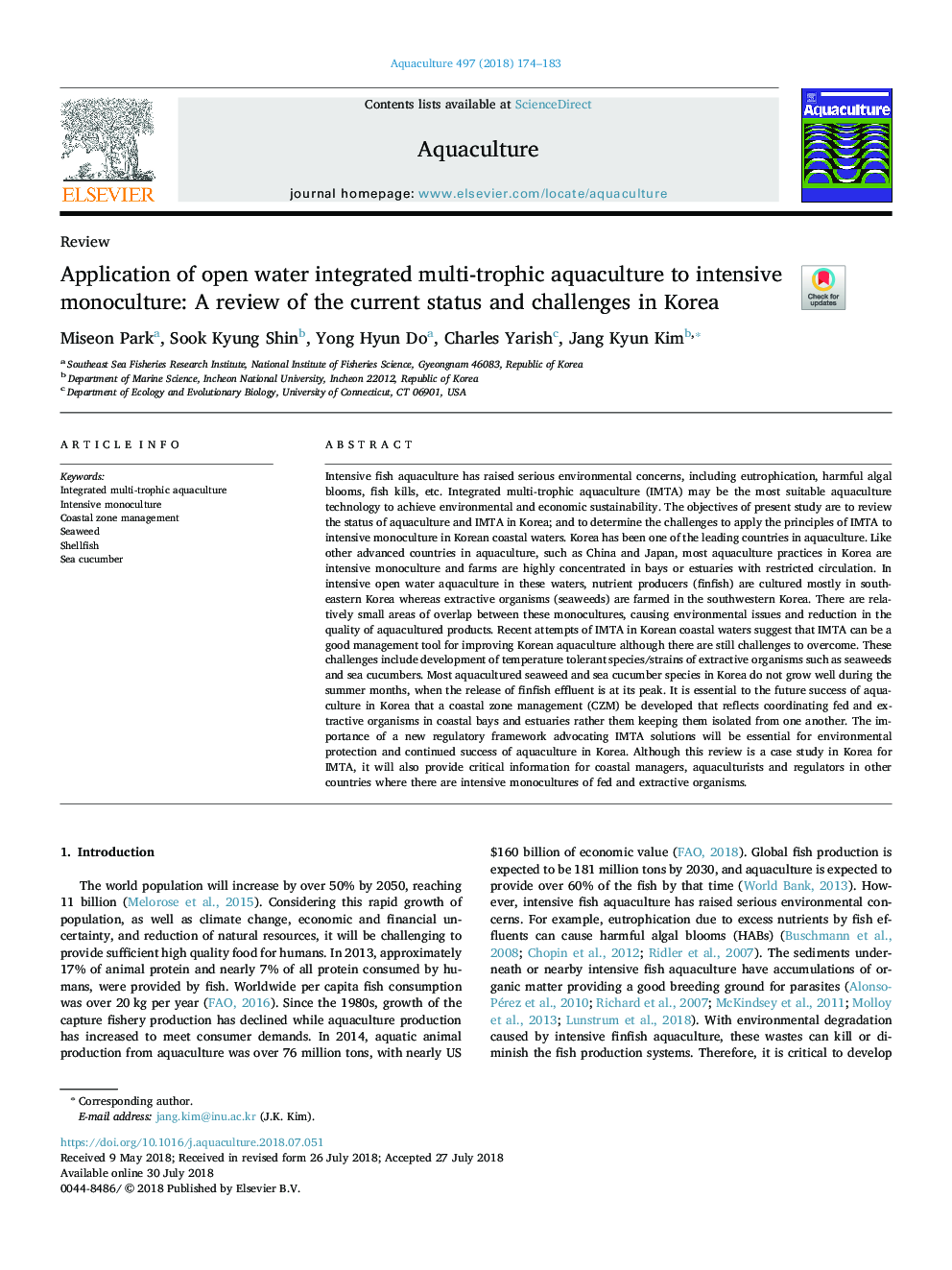| کد مقاله | کد نشریه | سال انتشار | مقاله انگلیسی | نسخه تمام متن |
|---|---|---|---|---|
| 8492984 | 1552791 | 2018 | 10 صفحه PDF | دانلود رایگان |
عنوان انگلیسی مقاله ISI
Application of open water integrated multi-trophic aquaculture to intensive monoculture: A review of the current status and challenges in Korea
ترجمه فارسی عنوان
استفاده از آبزی پروری چندگانه مجتمع آبی مجدد به تک کشتی فشرده: بازبینی وضعیت فعلی و چالش های موجود در کره
دانلود مقاله + سفارش ترجمه
دانلود مقاله ISI انگلیسی
رایگان برای ایرانیان
کلمات کلیدی
یکپارچه چند فرهنگی پرورش ماهی، تک کشت منفرد، مدیریت منطقه ساحلی، جلبک دریایی، خرگوش خیار دریایی،
موضوعات مرتبط
علوم زیستی و بیوفناوری
علوم کشاورزی و بیولوژیک
علوم آبزیان
چکیده انگلیسی
Intensive fish aquaculture has raised serious environmental concerns, including eutrophication, harmful algal blooms, fish kills, etc. Integrated multi-trophic aquaculture (IMTA) may be the most suitable aquaculture technology to achieve environmental and economic sustainability. The objectives of present study are to review the status of aquaculture and IMTA in Korea; and to determine the challenges to apply the principles of IMTA to intensive monoculture in Korean coastal waters. Korea has been one of the leading countries in aquaculture. Like other advanced countries in aquaculture, such as China and Japan, most aquaculture practices in Korea are intensive monoculture and farms are highly concentrated in bays or estuaries with restricted circulation. In intensive open water aquaculture in these waters, nutrient producers (finfish) are cultured mostly in southeastern Korea whereas extractive organisms (seaweeds) are farmed in the southwestern Korea. There are relatively small areas of overlap between these monocultures, causing environmental issues and reduction in the quality of aquacultured products. Recent attempts of IMTA in Korean coastal waters suggest that IMTA can be a good management tool for improving Korean aquaculture although there are still challenges to overcome. These challenges include development of temperature tolerant species/strains of extractive organisms such as seaweeds and sea cucumbers. Most aquacultured seaweed and sea cucumber species in Korea do not grow well during the summer months, when the release of finfish effluent is at its peak. It is essential to the future success of aquaculture in Korea that a coastal zone management (CZM) be developed that reflects coordinating fed and extractive organisms in coastal bays and estuaries rather them keeping them isolated from one another. The importance of a new regulatory framework advocating IMTA solutions will be essential for environmental protection and continued success of aquaculture in Korea. Although this review is a case study in Korea for IMTA, it will also provide critical information for coastal managers, aquaculturists and regulators in other countries where there are intensive monocultures of fed and extractive organisms.
ناشر
Database: Elsevier - ScienceDirect (ساینس دایرکت)
Journal: Aquaculture - Volume 497, 1 December 2018, Pages 174-183
Journal: Aquaculture - Volume 497, 1 December 2018, Pages 174-183
نویسندگان
Miseon Park, Sook Kyung Shin, Yong Hyun Do, Charles Yarish, Jang Kyun Kim,
